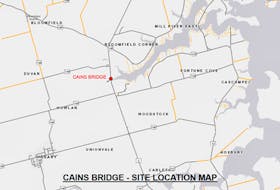The provincial government and Strait Crossing are at odds over a pilot program implemented at the Confederation Bridge to try out a cashless payment system for tolls.
The 30-day pilot began Nov. 21, when motorists crossing the bridge between 10 p.m. and 6 a.m. were told no cash payments would be accepted.
The province is taking strong issue with this, saying it could restrict access for some Islanders.
Liberal MLA Richard Brown did not mince words in his assessment of the pilot Friday in the P.E.I. legislature, calling it “greatly disturbing.”
“We have a currency act in this country that says legal tender is the dollar, and it should be accepted by every business,” Brown said, adding that the Confederation Bridge is a federally owned asset that should be open to all Islanders and Canadians to use with any legal currency.
“I believe this is a wrong policy.”
But Michel LeChasseur, general manager for Strait Crossing Bridge Limited, says this is not a “policy” and that people who show up with only cash will not be turned away.
“I want to remove the panic. This is a pilot project to see if our clients like or don’t like the idea, and if you show up overnight with cash only you will be served.”
Provincial Transportation Minister Paula Biggar says the province was not consulted before this pilot was implemented, which she says is a concern.
She has sent a letter to Strait Crossing and to the federal transportation minister outlining the province’s objections to restricting payment for bridge tolls to credit or debit only.
“This could restrict accessibility to Islanders who need to leave the Island and only have cash on them, so it is a concern.”
LeChasseur stressed this pilot is really more like a survey to determine if bridge users would be interested in or willing to go cashless.
He acknowledged the pilot is aimed in part at looking for ways to cut costs, noting that cash payments account for an average of just eight transactions at night.
“I don’t think I need to talk to the province to say I’m doing a survey when I didn’t change or reduce the service to people using the bridge,” he said.
“We’re a business like anybody else and we look at all the angles. Handling cash is expensive and, at that time of day, is a security risk.”
LeChasseur says no decisions have yet been made on whether to make this pilot a permanent policy. Any movement to do so would require the approval of Transport Canada, which would take some time to obtain.
If it ever did become permanent, it would not be in the summer months with so many visitors that travel to the Island via the bridge, LeChasseur added.
But Brown pointed out some low-income Islanders may not be able to afford the costs associated with using credit or bank cards and that many Islanders must travel off-Island for medical appointments.
Biggar says she shares those concerns.
“I have access to a credit card or an ATM card, but not everyone on Prince Edward Island does, so, as minister of transportation for P.E.I., I am very concerned that it could restrict Islanders and I am totally against it.”
Twitter.com/GuardianTeresa









